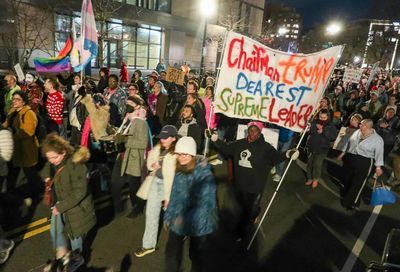Consumer Financial Protection Bureau says banks and lenders cannot discriminate against LGBTQ applicants
CFPB guidance is the latest action by the Biden administration to combat forms of anti-LGBTQ discrimination.

The U.S. Consumer Financial Protection Bureau will enforce a federal ban on discrimination in lending cases where a customer is denied credit because of their sexual orientation or gender identity.
On Tuesday, the government agency, which is intended to protect consumers from financial fraud and abuse, issued guidance claiming that the Equal Credit Opportunity Act prohibits banks and lenders from rejecting credit and lending services to applicants who identify as LGBTQ, those who don’t conform with traditional sex- or gender-based stereotypes, or applicants who might have been refused based on their social or other associations.
“In issuing this interpretive rule, we’re making it clear that lenders cannot discriminate based on sexual orientation or gender identity,” CFPB Acting Director David Uejio said in a statement. “The CFPB will ensure that consumers are protected against such discrimination and provided equal opportunities in credit.”
The CFPB’s guidance is rooted in a U.S. Supreme Court decision from last June, which found that prohibitions on sex-based discrimination apply equally to people who are discriminated against due to their sexual orientation or gender identity.
A month after the decision, the CFPB sought out public comments and information to identify opportunities to prevent credit discrimination, in compliance with the high court’s decision. The guidance also complies with an executive order issued by President Joe Biden earlier this year seeking to prohibit various forms of discrimination against the LGBTQ community, in accordance with the high court’s findings.
In 2016, under the Obama administration, the CFB had previously responded to an inquiry from Services & Advocacy for GLBT Elders, finding that existing laws prohibiting sex discrimination should extend to LGBTQ applicants. But that interpretation was not embraced by the Trump administration, and, with no definitive court ruling on the extent of prohibitions on sex discrimination at the time, the agency had no impetus to move forward with a rule change.
In issuing its latest guidance, the CFPB vowed to hold accountable financial institutions that engage in credit discrimination, and called on Congress to pass the Equality Act, which would cement credit protections in statute — underscoring the fact that its current guidance could potentially be reversed or repealed by a future presidential administration hostile to LGBTQ rights.
In addition to the Equality Act, U.S. Rep. Ritchie Torres (D-N.Y.) has introduced a bill, the LBGTQ Business Equal Credit and Enforcement Act, which would amend part of the Equal Credit Opportunity Act to require institutions to collect data on credit applications submitted by LGBTQ-owned businesses along with data they are already supposed to be collecting on minority- and women-owned businesses.
LGBTQ advocates praised the guidance as an important step towards achieved equality for LGBTQ financial consumers.
“While the Consumer Financial Protection Bureau previously had a track record of reading the [Equal Credit Opportunity Act]’s sex discrimination protections to apply to LGBTQ people, this explicit interpretive rule renews and formalizes that commitment,” Karen Loewy, senior counsel and seniors strategist at Lambda Legal, said in a statement. “This rule sends a clear message to all kinds of lenders — from giant banks and credit unions to payday lenders and mortgage brokers — that discriminating against LGBTQ people is off limits.
See also: Congressman Ritchie Torres urges government to collect LBGTQ data on COVID-19 pandemic
“Studies show that same-sex couples routinely have been denied opportunities and faced less favorable terms than different-sex couples in seeking mortgages. LGBTQ people regularly report being denied lines of credit because of their sexual orientation or gender identity or expression,” Loewy added. “These denials exacerbate housing and economic vulnerability, preventing LGBTQ people from buying a home, leasing a car to drive to work, or starting their own business enterprise. With this interpretive rule by the CFPB, LGBTQ people denied equal credit will have a clear route to getting that discrimination investigated and addressed.”
The Human Rights Campaign noted that the CFPB’s decision comes on the heels of the Department of Housing and Urban Development’s announcement that they will enforce the Fair Housing Act to investigate and remedy anti-LGBTQ discrimination in housing, consistent with the Supreme Court’s ruling on sex-based discrimination.
“Thanks to the Consumer Federal Protection Bureau and President Biden, LGBTQ people can no longer be denied a loan or a credit card because of their sexual orientation or gender identity,” HRC President Alphonso David said in a statement. “This announcement implementing the Supreme Court’s Bostock ruling and applying it to the Equal Credit Opportunity Act will make a huge impact on the lives of LGBTQ people, particularly transgender people and LGBTQ people of color who face disproportionate rates of discrimination.
“From Day One, the Biden administration has made unprecedented and immediate changes to the lives of the 11 million LGBTQ people across the country, and we look forward to continuing our work together with the president and his administration moving forward.”
Read more:
Conservatives yelled anti-gay slurs at children outside Florida school
Arkansas committee passes bill banning trans youth from accessing gender-affirming health care
North Carolina will list transgender students’ preferred names on their school records
Support Metro Weekly’s Journalism
These are challenging times for news organizations. And yet it’s crucial we stay active and provide vital resources and information to both our local readers and the world. So won’t you please take a moment and consider supporting Metro Weekly with a membership? For as little as $5 a month, you can help ensure Metro Weekly magazine and MetroWeekly.com remain free, viable resources as we provide the best, most diverse, culturally-resonant LGBTQ coverage in both the D.C. region and around the world. Memberships come with exclusive perks and discounts, your own personal digital delivery of each week’s magazine (and an archive), access to our Member's Lounge when it launches this fall, and exclusive members-only items like Metro Weekly Membership Mugs and Tote Bags! Check out all our membership levels here and please join us today!



















You must be logged in to post a comment.